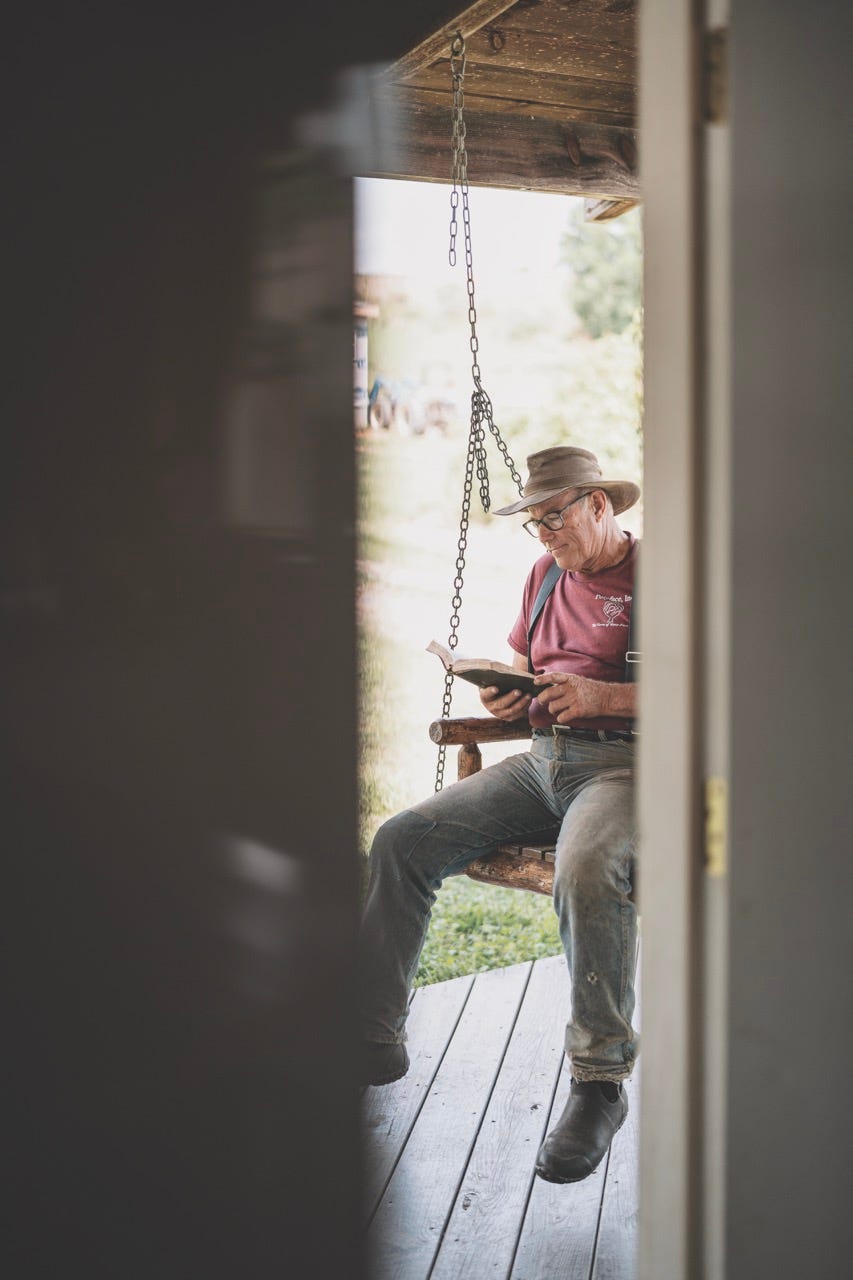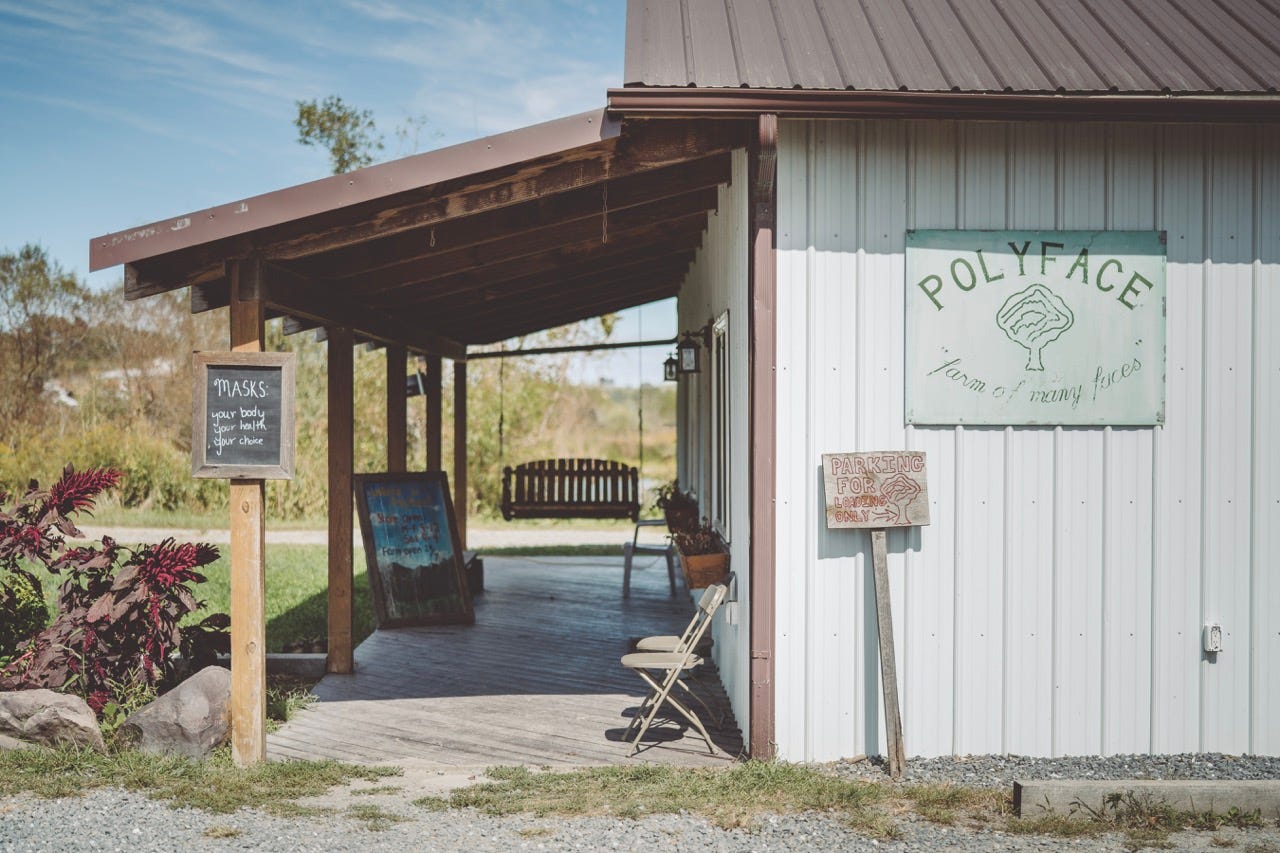CONFESSIONS OF A STEWARD
Preference vs Assault
By Joel Salatin
One of the most difficult tensions in modern America is the decreasing distinction between preference and assault. When do my preferences become an assault on you?
The most poignant societal example of this recently was perceptions about taking the COVID jab and masking versus those who preferred not to do it. Historically, most personal preferences have been seen as exactly that: personal. They are not elevated to an aggressive assault on their neighbor.
For the record, I chose not to receive the covid jab (it is not a vaccine, in my opinion, but a bioweapon) and did not believe for an instant that a mask would contain something as small as a virus. That would be like trying to keep flies out of a chicken house with 2-inch chicken wire. The problem developed early though, when those of us who elected not to participate in the paranoia—not to mention, junk science—were accused of being murderers.
Yes, I wish I were making this up, but I’m not. The social orthodoxy condemned us non-participants as violent aggressors. Most of us grow up with the expression, “Your freedom ends at my nose,” or something like that. Another one is, “Sticks and stones may break my bones, but words will never harm me.” Assault has generally been defined as a physical hit, something that wounds me with broken skin or bruises… or death.
The covid situation, however, took preferences to a new level. People asked me why I wanted to kill them. In other words, my failure to take the bioweapon or put chicken wire on my face, many viewed as my shooting them with a gun. They literally accused me of killing them. Later on, of course, these folks all got the bioweapon, but even their perceived faith in and protection of mRNA did not keep them from feeling assaulted by my “obnoxious, uncharitable, violent” behavior.
I’ve lived with this for a long time in our farming circles, where I’ve been told—yes, to my face—that I’m a Typhoid Mary and a bioterrorist. The reason? On our farm, we have the unmitigated gall to not vaccinate our cows and chickens. And our chickens commiserate with Red-winged Blackbirds, who then allegedly transport our diseases to Tyson chicken houses and threaten the bankruptcy of neighbors’ farms and the starvation of children in Bangladesh who will no longer enjoy American factory chicken. I wish I was making this up or overstating the situation.
This puts the Christian in a terrible quandary. Most of us try to live peaceably with people and the thought that a majority of society views us with such disdain and criticism gives us pause. It’s a real conundrum.
It’s similar to the Swiss who thought the Anabaptists’ failure to give their sons as mercenaries in European wars was an assault on society. How can people live if the society’s economic engine—sending sons to war—shuts down? People will starve. They won’t buy watches. Trying to explain a different position in such a context is nigh unto hopeless, and generally only engenders renewed push back, even to the point of martyrdom.
Government agencies in the last 50 years have begun using a new terminology to describe your cows and my cows. Rather than viewing my cows as my cows, or your chickens as your chickens, numerous regulatory publications now refer to the “national herd” and the “national flock.” In other words, these animals aren’t our personal property; they are simply part of the national herd or flock. Our tomatoes are part of the national produce pool.
As mandatory Radio Frequency Identification (RFID) tag regulations wend their way through Congress and other mandated requirements for herd health or tracking become more confining, many of us will find ourselves yet again trying to defend what most people will think is indefensible.
I’ve often wondered what it would take for me to interfere with someone’s children or personal property. What would it take for me to think I’m justified in removing children from a home or confiscating a farmer’s livestock or crop? I’m reminded that when our family began homeschooling in the late 1980s, government truant officers descended on homes and took children into foster care for the anti-social behavior of homeschooling. It was considered deviant behavior and such trauma to children that it justified Child Protective Services to rip children out of the home in order to save them from homeschooling.
Indeed, we’re seeing this same kind of thinking in some states that are excising Bible-believing people from their foster care pool. Society at large views biblical lifestyles as an indoctrination assault on these precious children who need to be taught they can pick their sex and decide on their own ethics. We can’t have parental influence for such backward values. Haven’t we gotten over the Bible and Jesus, after all? Harumph, really.
I confess that this is one of the hardest areas for me to stay civil and charitable. Apparently it doesn’t matter that the government closes the farmers’ market but keeps the liquor store and Wal-Mart open. Apparently it doesn’t matter that half the nation’s jobs are essential and the other half are non-essential. It doesn’t matter that teen suicide has skyrocketed since sheltering at home and quivering behind masks closed the schools. And going to a church assembly? Forget it.
I’ve always been taught to “live and let live.” Living peaceably means allowing a fairly wide range of values and lifestyles. If it means anything, it means having enough faith in my own convictions that I don’t feel threatened by someone else’s perceptions. If you want to join the military and I don’t, we can both enjoy heaven. If you want to drive a car and I want to ride a horse, heaven’s big enough for both of us.
But in this modern arena, where societal rage reaches new crescendos, we Christians are in a real spot. During covid, I found that the more I tried to explain my position, the more antagonistic the defenders of the official narrative became. Try as I might, I could not punch through their fear and accusation that I cared not a bit about human life, not least of which was theirs.
Indeed, at our farm store we posted a nice big sign: “Masks: Your body, Your health, Your choice.” Oh my. The health department called and threatened litigation because we were not protecting a public place. Actually, most of our customers loved it, took pictures of the sign, and put it out on social media. Yikes! Others saw the sign, jumped back in their cars, and sped out of the parking lot like a nest of hornets was after them.
Isn’t it interesting how intolerant we can become when we join what I call the cult of orthodoxy? We can fall out over the silliest things. Clothes. Music. Vocations. Equipment. Recreation. What we’re seeing in society, I think, is the crescendo of intolerance that a more biblically-based culture historically held in check by widespread Christian virtues. The fact that a farm neighbor now believes I want to kill his cows because I don’t vaccinate mine is a hard cross to bear.
The mechanical-chemical philosophy of orthodox conventional farming in modern America posits that wellness comes from a bolus or needle and not from a God-given immune system. No, it comes from a pharmaceutical concoction that fixes what God failed to achieve with His creation. Something was missing. It’s always been missing, and we’ve finally discovered it: drugs. As a farmer, if I dare question that philosophy, I’m not just expressing a preference.
The other side isn’t content to wag their heads and wander off mumbling about lunatics and crazy people. No, the intolerance crescendo now is that I threaten the national herd. I want babies in Bangladesh to starve. I want my neighbors to lose their farms. It never ends, but continues in a downward spiral, placing burden after burden that is impossible—short of God’s interventive illumination—to explain.
My consolation is that Jesus faced the same intolerance, to the point of death. He could never get through to the Sadducees and Pharisees, who were the elite academics of his day. In modern parlance, they were the influencers. And they whipped society into a frenzy, enough to put Christ on a cross. So we take up our cross—this burden—happily, counting it all joy to be misunderstood, inappropriately judged, and demonized by mainstream society.
We can’t fix it. We aren’t responsible to fix it. We aren’t called to fix it. We are children of the narrow way, serving outside the camp. That has always been the calling and mission of truth, and it will continue to be until the end of time. Knowing this doesn’t make it easy, but it puts us in delightful company with a Savior who suffered in all points like us. When He looked on Jerusalem and wept, wishing He could gather His people under His wings like a mother hen, how our Savior’s heart burned to get them to understand His truth.
But they would not. And our privilege, our distinct honor, is to take this mantle into our modern world, speaking truth, being misunderstood, but enjoying the sanctity of the proper message. To give authenticity, however, we must extend tolerance and charity, even to those with whom we violently disagree, who are doing things we may think are horrendous, because we must “forgive them, for they know not what they do.” God help us to understand.



